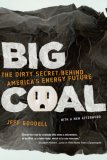Summary | Excerpt | Reading Guide | Reviews | Beyond the Book | Readalikes | Genres & Themes | Author Bio

Critics' Opinion:
Readers' Opinion:
First Published:
Jun 2006, 352 pages
Paperback:
Apr 2007, 352 pages
 Book Reviewed by:
Book Reviewed by:
BookBrowse Review Team
Buy This Book
President Bush made good on his debt. Within weeks of taking
the oath of office, Bush began staffing regulatory agencies with former coal
industry executives and lobbyists. Not surprisingly, Big Coal also played a
prominent role in Vice President Dick Cheney’s National Energy Policy
Development Group, which was charged with crafting a new energy policy.
The task force’s recommendations were unabashedly coal-friendly, including
a call for up to 1,900 new power plants over the next twenty years; a $2
billion, ten-year subsidy for “clean coal” technology; and a recommendation
that the Department of Justice “review” enforcement actions against dirty coal
burners.
Finally, the terrorist attack on the World Trade Center on
September 11, 2001, was an unexpected boon for Big Coal. Politically, it
took the spotlight off many of the Bush administration’s controversial coal-
friendly energy policies, which were just beginning to make headlines. More
important, 9/11 changed the tone of the debate about energy in America,
making many of us reconsider the high cost of our dependence on oil from
the Middle East. In our globally connected world, “energy independence” is
more of a political slogan than a practical reality. But as long as American
soldiers were dying in the oil-rich Middle East, it seemed downright
unpatriotic to oppose coal.
For Big Coal, this change in America’s political and economic
climate was transformative. Around the country, any open patch of ground
near a railroad, a high-voltage transmission line, and a decent-size population
of electricity consumers became a possible site for a new coal plant. As of
2005, more than 120 new plants, representing more than $99 billion in new
investment, were either planned or under construction in the United States.
Long-shuttered mines were reopening, and old coal miners were dusting off
their boots. Wall Street analysts, in a swoon over the old rock (the Street
loves big, expensive projects with all-but-guaranteed returns such as coal
plants), began cranking out pro-coal reports with titles such as “Come On
Over to the Dark Side” and “Party On, King Coal!” The rebirth of coal is not
just about energy; it is also a cultural uprising of sorts, a taking back of a key
part of America’s economic life that is, in its own way, as reactionary as the
public campaigns against evolution or gay marriage. It is about the revenge of
the Old Economy over all those technology-loving geeks who thought an
energy revolution was at hand, who said that the forces of creative
destruction would wreak havoc on one of the world’s great industrial empires,
and who naively believed that the future would be powered by solar panels
and biodiesel.
Lost in the hype, of course, is a sober accounting of what this
new coal boom might really cost us. In January 2006, seventeen men died in
Appalachian coal mines, including twelve men in an explosion at the Sago
mine in northern West Virginia and two more after a fire in the Alma mine in
the southern part of the state. Since 1900, more than 100,000 people have
been killed in coal mine accidents, many forever entombed by collapsed
roofs and tumbling pillars. Black lung, a disease common among miners from
inhaling coal dust, can be conservatively estimated to have killed another
200,000 workers. And burning coal is even more deadly. In just the past
twenty years, air pollution from coal plants has shortened the lives of more
than half a million Americans. The broad legacy of environmental
devastation—acid rain, polluted lakes and rivers, mined-out mountains—is
impossible to tabulate. In Appalachia alone, the waste from mountaintop
removal mining (instead of removing the coal from the mountain, the mountain
is removed from the coal) has destroyed more than 700 miles of streams,
polluted the region’s groundwater and rivers, and turned about 400,000 acres
of some of the world’s most biologically rich temperate forests into flat,
barren wastelands. Plumes of toxic particles drift from Ohio northeast to
Maine; a molecule of mercury emitted from the stack of a power plant in
Tampa ends up in the brain of a child in Minneapolis. If and when fruit trees
start growing on the Alaskan tundra, American coal burners past and present
will be largely responsible.
Copyright © 2006 by Jeff Goodell. Reprinted with permission by Houghton Mifflin Company.





The Flower Sisters
by Michelle Collins Anderson
From the new Fannie Flagg of the Ozarks, a richly-woven story of family, forgiveness, and reinvention.

The House on Biscayne Bay
by Chanel Cleeton
As death stalks a gothic mansion in Miami, the lives of two women intertwine as the past and present collide.

The Funeral Cryer by Wenyan Lu
Debut novelist Wenyan Lu brings us this witty yet profound story about one woman's midlife reawakening in contemporary rural China.
Your guide toexceptional books
BookBrowse seeks out and recommends the best in contemporary fiction and nonfiction—books that not only engage and entertain but also deepen our understanding of ourselves and the world around us.